
Icons Erick Sermon, MC Lyte, Run-D.M.C., and more join Shanti Das on the mibo show to discuss the entertainment industry’s impact on Hip-Hop artists’ health.
Press release:
Atlanta, GA – In time for the 50 th Anniversary of Hip-Hop, prominent music-industry veteran and mental health advocate Shanti Das launches a new podcast: “the mibo show.” The platform aims to break the silence on the mental and physical health challenges impacting artists in the Hip-Hop industry and leverage the power of Hip-Hop culture to improve health outcomes for people of color.
“I hope to inspire our culture and community to take charge of their lives and make the mind and body their first priority,” says Das.
“the mibo show” derives its name from the combination of “mi” representing mind and “bo” representing body. By acknowledging the integral connection between mental and physical wellness, the podcast seeks to empower individuals to take a holistic approach to their health. “the mibo show” explores a range of health issues mostly affecting Black people. In each episode, experts from Johnson & Johnson provide insight, statistics and resources for listeners. Show topics include mental health, heart disease, diabetes and amputation, stroke prevention, hip replacement and more.
Das’ mission to help audiences prioritize mental and physical health began with depression and suicidal ideation. After her best friend died by suicide, Das realized she needed to prioritize herself and her mental health.
“Following my friend’s death and my own suicidal ideation, I soon realized that I needed a change. This change started from much-needed conversations,” says Das. “The entertainment industry is known to ‘go, go, go’ without much time to stop, process and simply talk in between — about health, or anything for that matter. Artists have rigorous schedules all of the time, and we hear buzzwords like ‘stressed out,’ ‘overwhelmed’ or ‘tired.’ Conversations weren’t really a thing back then, but they must be a thing now.”
In 2016, Das created Silence the Shame, a nonprofit organization dedicated to eliminating the stigma surrounding mental health. During the COVID-19 pandemic, she continued this work hosting health and wellness check-ins on her Instagram live, which later turned into original YouTube content.
“the mibo show” is Das’ latest effort along her health and wellness journey to help improve the health of others. Episodes 1-4 of the podcast launched this summer. The first in-person podcast, featuring Erick Sermon, discussed the impact of heart disease in the Black community. Additional podcast guests include legends Darryl McDaniels of Run-D.M.C., Doug E. Fresh and others. Upcoming episodes feature MC Lyte, Yo-Yo, David Banner and more.
Watch three of the episodes below, ahead of the release of episode 4 on August 11.
Episode 1 – Mental Health in the Black Community Guests: Darryl McDaniels (DMC) from Run-D.M.C. and Vanessa Broadhurst, EVP, Global Corporate Affairs of Johnson & Johnsonhttps://www.youtube-nocookie.com/embed/qz2EVcW8txU?enablejsapi=1
Episode 2 – Health & Hip-Hop Guests: Doug E. Fresh, Dr. Olajide Williams from Hip-Hop Public Health, and Vanessa Broadhurst, EVP, Global Corporate Affairs of Johnson & Johnsonhttps://www.youtube-nocookie.com/embed/j0nWMF9hsfs?enablejsapi=1
Episode 3 – Hip Replacement & Hip-Hop Guests: Big Tigger and Keith Palmer, Worldwide Vice President of Hip Reconstruction for DePuy Synthes, Johnson & Johnsonhttps://www.youtube-nocookie.com/embed/WTIQbvQ2KDc?enablejsapi=1
Episode 4 (August 11) – Heart Health and Hip-Hop Guests: Erick Sermon and Dr. JaBaris Swain, Cardiovascular Medical Executive of Johnson & Johnson; recorded before a live audience in the heart of Times Square
Follow the show on Instagram (@themiboshow) and YouTube (@themiboshow) and share your thoughts with #themiboshow.
October 23, 2023
October 23, 2023
https://trinitymedia.ai/player/trinity-player.php?pageURL=https%3A%2F%2Fwww.jnj.com%2Four-race-to-health-equity%2Ffinding-harmony-at-the-intersection-of-health-and-hip-hop&unitId=2900014327&userId=f0e570e0-9ac3-48e8-9452-942aa0dd265e&isLegacyBrowser=false&isPartitioningSupport=1&version=20240725_c8a3b6e9ab3dae9718c5625095591846033ebdf2&useBunnyCDN=0&themeId=477&unitType=tts-player
Multiple studies have shown that the world’s health systems need transformation to better serve, inform and treat people of color. As part of Our Race to Health Equity (ORTHE), Johnson & Johnson is launching initiatives that systemically address deeply rooted health inequities, connect communities of color with vital health information and change the culture of healthcare to meet the needs of all people.
Arguably, the leading approach to improving health literacy (and, in turn, health outcomes) is improving access to health information and education. However, focusing on accessibility alone fails to address another barrier for communities of color: mistrust of the medical system.
That’s why we’re doing this show—to bring resources and lived experiences to the community—so we can talk about mental and physical health.
Shanti Das
Johnson & Johnson is taking steps to bridge this gap and connect with communities of color in meaningful, lasting ways—with the help of key community leaders. To that end, Johnson & Johnson is participating in a new podcast, “the mibo show,” hosted by entertainment veteran and mental health advocate Shanti Das.
In each episode, Das sits down with a hip-hop trailblazer and an expert from Johnson & Johnson to have timely, candid and culture-forward conversations around mind and body wellness—especially challenges affecting communities of color. As each guest discusses their own mental and/or physical health journey, Johnson & Johnson subject matter experts offer health-related stats, industry insights and strategies to encourage us all to live a healthy lifestyle where we prioritize our mind and body wellness on a regular basis.
The resulting dialogue—a mix of intimate, conversational quips from well-known figures, coupled with more hard-hitting medical data from trusted experts—is precisely the formula that makes this podcast work.
“We know we can’t do it alone, so we have to be partners; we have to leverage opportunity and resources where they exist, and then we have to create opportunity and resources,” said Dr. JaBaris D. Swain, Medical Executive, Health Systems Integration| Cardiovascular & Metabolism, Medical Affairs at Johnson & Johnson Innovative Medicine, in a recent episode of “the mibo show.”
Hip-hop is the perfect avenue to broach discussions on mental and physical health in communities of color. Born in the Bronx in the summer of ’73, hip-hop has made an indelible mark on music and culture over the past half-century—influencing art, dance, entertainment, fashion, language, politics and so much more. Hip-hop also authentically connects with groups in ways that traditional medical systems often can’t (or, rather, haven’t).
“I applaud and appreciate these artists for sharing their stories and experiences with Shanti and the show’s audience,” said Johnson & Johnson Executive Vice President for Global and Corporate Affairs Vanessa Broadhurst, who has also appeared on the show. “We know there are many challenges surrounding health inequity, but we can continue to combat and eradicate them through open discussions on innovative platforms such as “the mibo show.”
We know there are many challenges surrounding health inequity, but we can continue to combat and eradicate them through open discussions on innovative platforms such as “the mibo show.”
Vanessa Broadhurst
From Charlamagne Tha God detailing his personal battle with anxiety to MC Lyte sharing anecdotes specific to women’s health, “the mibo show” gives hip-hop artists a platform that normalizes the discussion of health issues, promotes awareness and education, and highlights the power of music in effecting positive change.
“That’s why we’re doing this show—to bring resources and lived experiences to the community—so we can talk about mental and physical health,” said Das on a recent episode.
You can listen to the full episodes of “the mibo show” on your preferred podcast platform or subscribe to and watch the episodes on YouTube.
Guests on the show include MC Lyte, Yo Yo, and Doug E. Fresh.
By Shelby Stewart·
In a timely initiative coinciding with the 50th Anniversary of Hip-Hop, industry veteran and mental health advocate Shanti “Shoestring” Das has introduced a new podcast, the mibo show. With the mission of shattering the silence surrounding the mental and physical health challenges faced by artists in the hip-hop industry, the platform seeks to harness the influence of hip-hop culture to enhance health outcomes for people of color.
Born and raised in Atlanta, Georgia, Das grew up immersed in music from the likes of Grandmaster Flash & The Furious Five, The Sugarhill Gang, Run-D.M.C., LL Cool J, Whodini, and other artists who helped lay the foundation for hip-hop. Her passion for the genre led her to Syracuse’s S.I. Newhouse School of Communications in 1990, where she’d become an on-air DJ for WJPZ, the campus radio station. By 1991, she had risen to the position of Assistant Promotions Director and curated a Saturday night hip-hop show, carving a path that merged her love for music with her career goals.
In 1993, just four months after earning her Bachelor of Science degree in communications from Syracuse, Das’ journey took a momentous turn. LaFace Records, founded by industry titans Antonio “L.A.” Reid and Kenneth “Babyface” Edmonds, hired her as their National Director of Promotions.
Charged with nurturing the careers of iconic artists such as OutKast, TLC, Usher, Toni Braxton, and Goodie Mob, Das’ influence extended far beyond her title. Her dedication led to her promotion to LaFace’s marketing department, where she continued to foster the growth and exposure of the label’s roster. From orchestrating extensive promotional campaigns to embarking on tours with legendary artists like TLC – Das devoted herself to ensuring the world recognized the talent emerging from Atlanta’s music scene.
Today, Das, is the driving force behind the mibo show, with hopes of inspiring the culture and doing transformative work, especially as it pertains to mental health. “I hope to inspire our culture and community to take charge of their lives and make the mind and body their first priority,” Das said.
https://www.instagram.com/p/Cu9NtbJrDjf/embed/captioned/?cr=1&v=14&wp=640&rd=https%3A%2F%2Fwww.essence.com&rp=%2Fentertainment%2Fshanti-das-launches-the-mibo-show-address-health-hip-hop%2F#%7B%22ci%22%3A0%2C%22os%22%3A966%7D
The show’s name comes from the fusion of “mi,” signifying the mind, and “bo,” representing the body. The mibo show stands as a testament to the interconnectedness of mental and physical well-being. With a primary focus on health issues disproportionately affecting the Black community, each episode explores topics including mental health, heart disease, diabetes, stroke prevention, and hip replacement, among others. Echoing the much needed conversation are experts from Johnson & Johnson contributing insight, statistics, and valuable resources to empower listeners.
Das’ journey toward advocating mental and physical health took root in her personal struggle with depression and suicidal thoughts. The tragic loss of her best friend to suicide served as a wake-up call, propelling her to embark on a journey of self-prioritization and to initiate open dialogues about health challenges. Recognizing how taxing the entertainment industry can be, Das stressed the importance of conversations that had been lacking. “The entertainment industry is known to ‘go, go, go’ without much time to stop, process, and simply talk in between — about health, or anything for that matter,” Das said.
In 2016, Das founded Silence the Shame, a non-profit organization dedicated to eradicating the stigma surrounding mental health. Amidst the COVID-19 pandemic, she continued her advocacy through health and wellness check-ins on Instagram Live, which eventually evolved into YouTube content.
The mibo show is the latest manifestation of Das’ commitment to fostering wellness among the masses. The podcast’s first four episodes, launched this summer, have already made an impact. The inaugural in-person episode featured Rapper Erick Sermon and dove into the ramifications of heart disease within the Black community. Upcoming episodes boast a star-studded lineup including Darryl McDaniels of Run-D.M.C., Doug E. Fresh, MC Lyte, Yo-Yo, and David Banner.
By advocating for open conversations on mental and physical health, the mibo show embodies Shanti Das’s mission to transform lives and uplift the community not only through awareness, but education.
Listeners can access the podcast on a variety of platforms, including YouTube, Spotify, Stitcher, Apple Podcasts, Amazon Music, Google Podcasts, Audible, and iHeart. Follow the mibo show on Instagram and YouTube.
By Carri Helman
Dec. 4 2023, Published 7:00 a.m. ET
With 50 years of hip-hop under our belts now, it’s exciting to see how the culture is influencing the world far beyond just the beats and bars. Hip-hop is everywhere, and a key thread within the fabric of culture across the globe.
But it’s not just the music we grew up on that’s making bold moves and showing up in new ways. The artists and industry greats themselves are stepping up and out of their usual spaces to make different kinds of changes to and for the culture. Shanti Das is among them.
Shanti’s music industry career began over 30 years ago, working closely with hip-hop legends like Outkast, Usher, and TLC. She started her professional rise as an Urban Promotions Assistant at Capital Records in 1991, and just 7 short years later, was named “Music Executive of the Year” by Impact Magazine. She continued to impact the hip-hop scene and culture for the next decade+ with other major labels like Sony Music Atlanta, LaFace Records, Arista Records, and Columbia Records, finalizing her iconic climb as Executive Vice President of Urban Marketing and Artist Development at Universal Motown in 2009.
But just as hip-hop itself has evolved, so has Shanti. These days her conversations with industry greats are a little less “hip-hop” and a little more “human.”
In 2014, Shanti was hit hard when a close friend ended her own life. Through her grief process, she recognized that she had some unhealed wounds from her own father’s suicide when she was just 7 months old. Although often considered taboo, Shanti turned to therapy and took a more intentional approach to her own mental and physical health.
Since then, she’s dedicated her life to repairing generational traumas and “silencing the shame” of asking for help. Her podcast, The Mibo Show (which stands for “mi” for mind, “bo” for body), gives the giants of hip-hop a platform to speak to the culture – real discussions, about real health issues, with real (famous) people. Her conversations showcase the simple fact that we’re all human, we all need a helping hand at times, and it’s more than okay to ask for it.
Her Agenda sat down with Shanti Das to dig a little deeper into her purpose and passions and she was not shy about sharing her journey.
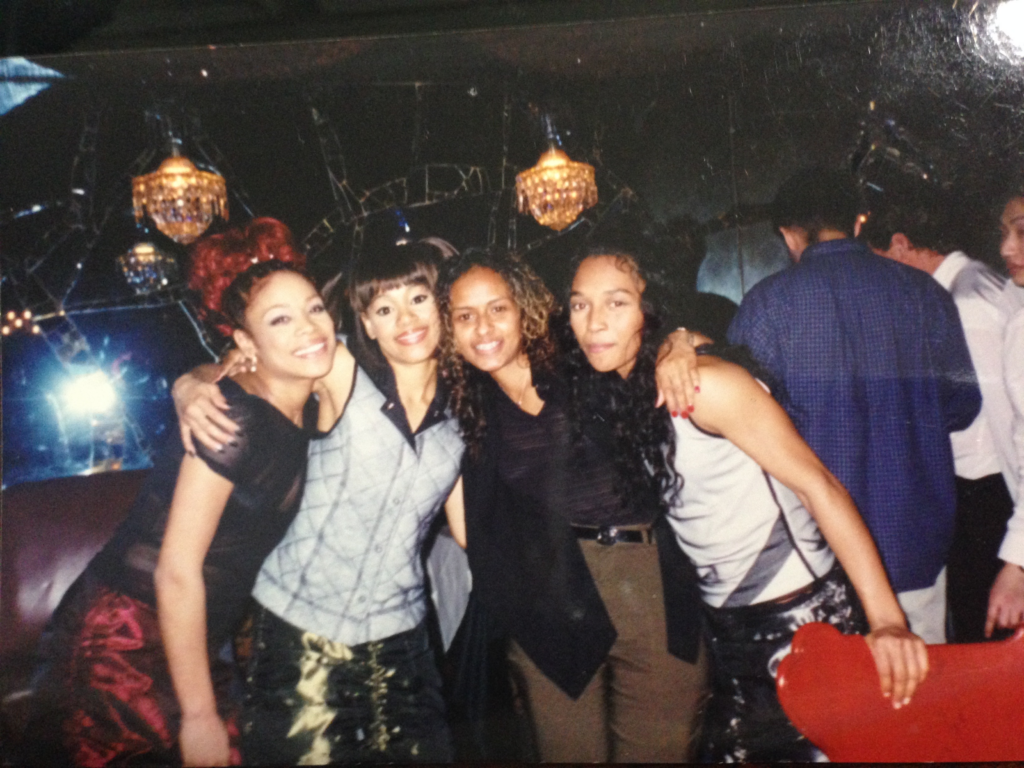
Her Agenda: Tell us a little about your history in the music industry.
Shanti Das: I got my start in the early ‘90s so I was in the entertainment industry for almost 20 years.
My first internship was at Capitol Records while I was a sophomore in college and I did that for 2 summers, working in the promotional department. That was back when MC Hammer was on the label, Young MC – really old-school artists.
Once I graduated from Syracuse in 1993, I got hired at LaFace Records in Atlanta, GA. The first record I ever worked on was Players Ball from Outkast. I did promotions on their first two albums and marketing on the last two. And I was actually at the Source Awards in 1995 when Outkast won and Dre uttered those infamous words, “The South got something to say.”
In the late ‘90s, I also brought Ludacris to L.A. Reid. He didn’t end up signing with LaFace Records, but I was one of the few people in Atlanta who really wanted to bring him to our label. Although I didn’t do A&R, I felt I had a pretty good ear for music.
Fast forward, when I went up to New York City, I did the marketing on Killer Mike’s first album, worked alongside Jermaine Dupri, and later, got to work with Busta Rhymes.
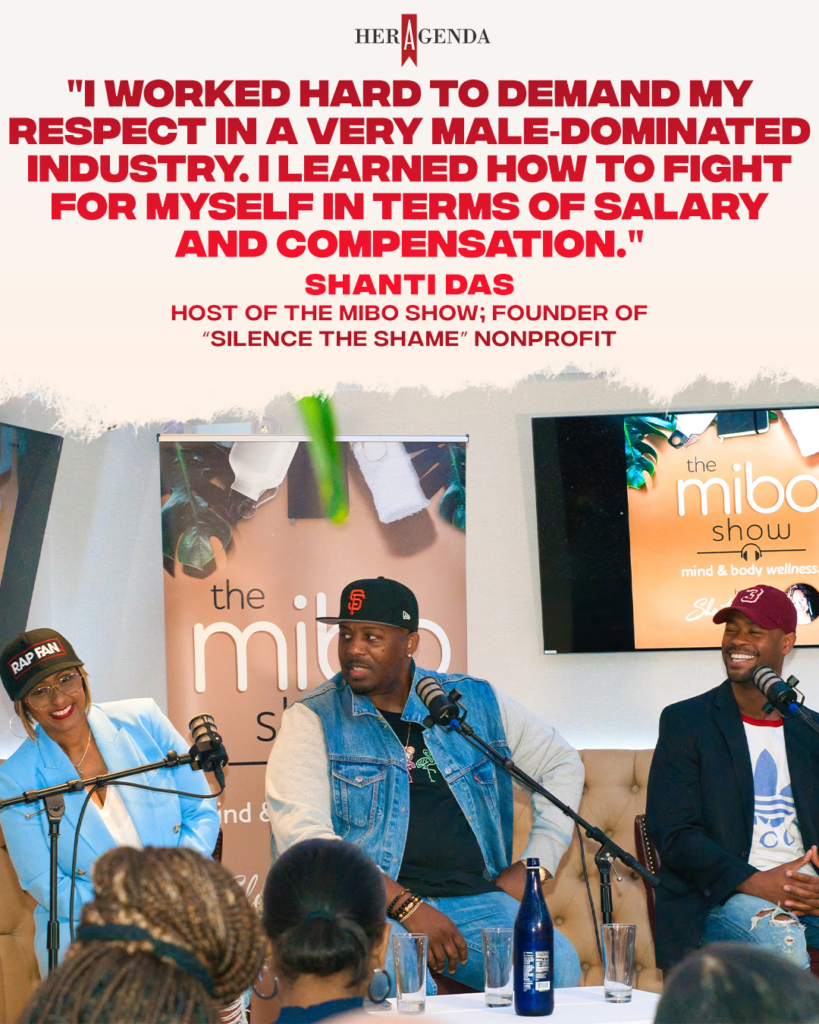
Her Agenda: What are some of the struggles you’ve faced in your climb?
Shanti Das: I worked hard to demand my respect in a very male-dominated industry. I learned how to fight for myself in terms of salary and compensation. I eventually figured out what it took in terms of getting an attorney and negotiating what I felt was my value.
And then also, not being afraid to ask for what I feel I deserve. I think oftentimes we can be complacent with what we’re given because we’re just happy for those opportunities. Whereas men, they’ll have these big pie-in-the-sky outlandish demands, but they ask for them and they get them. But half the battle is asking.
Her Agenda: Do you have any words of professional wisdom for women aspiring to be business leaders?
Shanti Das: We have to believe and feelthat we’re deserving and that we’re valued. I think that’s sometimes where we struggle. Women have to learn how to push forward and really exude that confidence. Really show that you deserve to be there. And the way you do that is by being so good, they can’t refuse you. There’s nothing better than hard work and determination – the statistics and the work will speak for itself.
I wrote a book about my career called‘The Hip Hop Professional – A Woman’s Guide To Climbing The Ladder of Success In The Entertainment Industry.‘ I stepped away from the industry but I learned a lot as a woman. I understood the importance of mentorship and having people to support me.
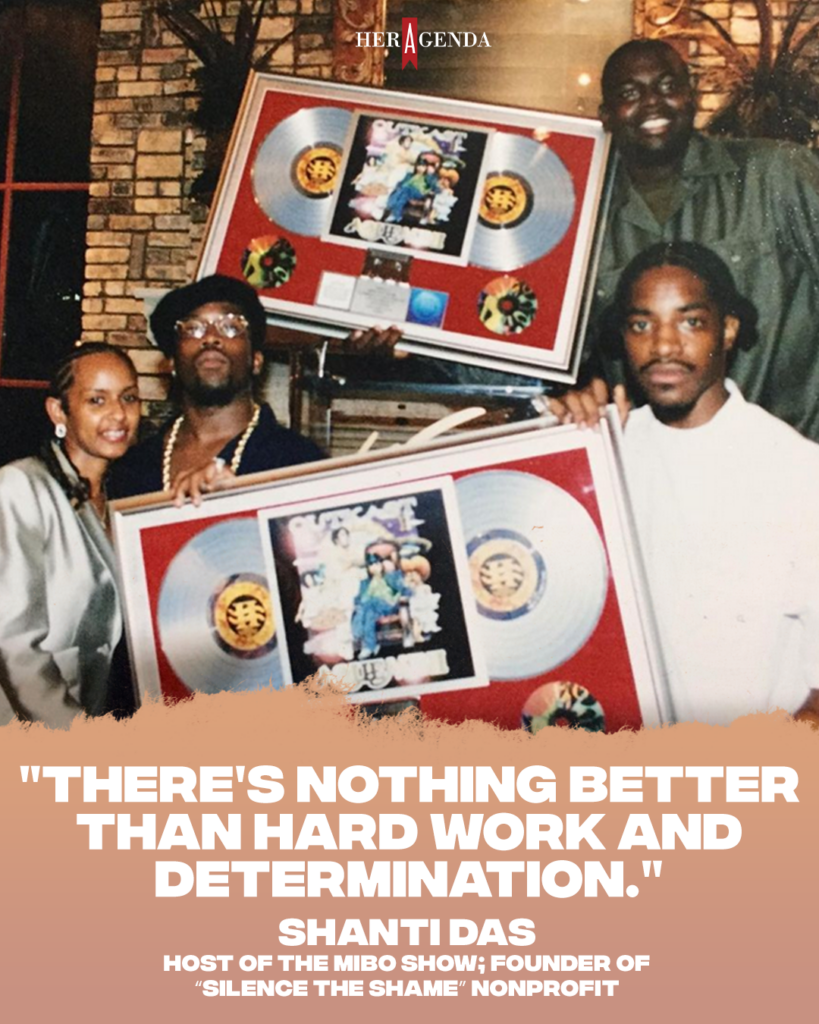
Her Agenda: Did spending so many years in the music industry impact your overall health?
Shanti Das: I was a workaholic and I had pretty much dedicated my life to this career. I think I’ve sacrificed a lot of family time, outings, and different things from a friend perspective. The first time I felt like the work was impacting my mental health was around 2010-2011. I [considered ending my life.] I don’t think I meant that at the time. I just was so stressed out, didn’t really have healthy ways to cope, and wasn’t really leaning on mentors. The number of hours I was working, the lack of sleep, and not eating properly – all of that was really taking a toll on my mental health.
Her Agenda: How did you manage the stress?
Shanti Das: I went to counseling for a couple of months and then threw myself back into the work – I should have stayed in there a lot longer. About five years later, I was diagnosed with cervical spinal stenosis. I thought I was going to have to have spinal surgery and my doctor said it was a direct result of stress – I was in my early 30’s. That’s when I knew it was a problem and I decided to walk away – at the height of my career, making a lot of money.
Then four years later, my best friend took her own life. That reallytook a toll on my emotional health and wellness, and in 2015, I came close to taking my own life.
As a community, we didn’t talk about mental health much growing up. Had I been better equipped with tools and really understood what therapy was like, or how antidepressants could have benefited me, who knows? The work that I’m doing now is definitelyimportant work for our community. But maybe had I been better equipped, the journey might not have been quite as tough.
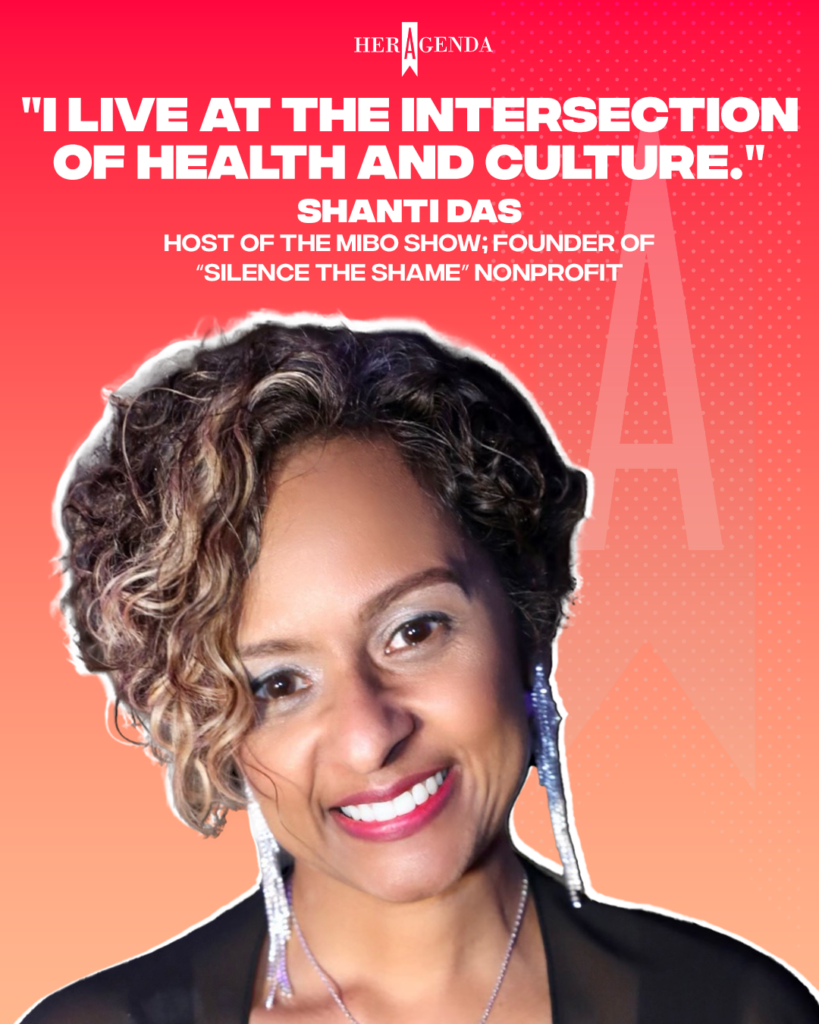
Her Agenda: What are some of the other ways you’re spreading your message?
Shanti Das: My nonprofit – Silence the Shame – is so important because we’re still knocking down stigmas. As well as my podcast, which I launched earlier this year – The Mibo Show. Being able to talk to others about their journeys and what they’re going through still goes a long way. If we see someone talking about their own struggles and opening up, saying how much therapy has helped them, or different things that they’re doing from a wellness perspective, that is something that we want to permeate in culture and society right?
I just want to do my part to really try to affect culture in a positive way and bring as many resources to the table, which is why I’m excited about my partnership with Johnson and Johnson. They supply medical experts for each episode of The Mibo Show and they’re really committed to bringing a lot of really wonderful resources to the community so I couldn’t do this work without them.
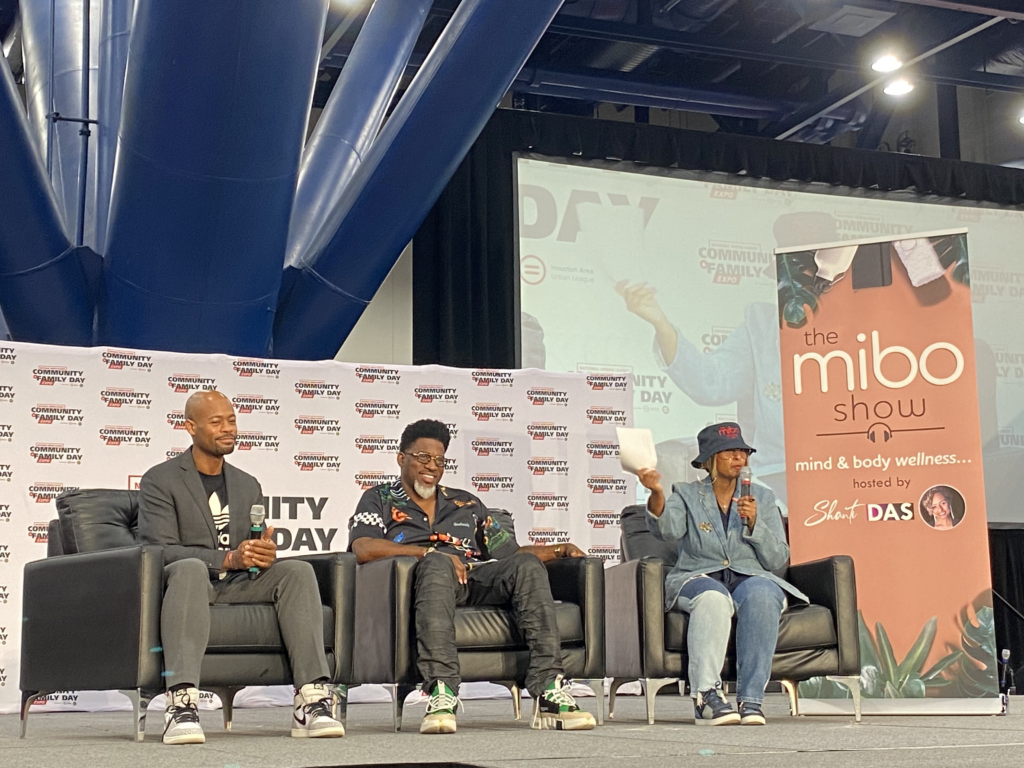
Her Agenda: Will there be a season 2 of The Mibo Show?
Shanti Das: I’m going to put it out there and say ‘yes, we’re going to have a season 2’ and God willing, we’ll be able to open up into other industries such as sports and entertainment. Maybe some actors and actresses, the fashion industry, and political icons – just keep these health conversations going.
[Editor’s note: This interview has been edited for length and clarity.]
By Emilia Benton • October 10, 2023
This article is brought to you as part of the ASCAP Wellness Program.
There’s no denying that discussions surrounding mental health, and taking care of it, are becoming more common and less stigmatized than ever before. But at the same time, many people with minority backgrounds are still hesitant to seek the help they need due to attitudes that have historically existed within their communities, and still persist today. Shanti Das, a former music executive, is no exception.

After graduating from college, Das was seemingly living her dream. She’d broken into the music industry, interning at giants like Sony Music and Capitol Records before being hired as a promotions director at La Face Records in the mid-1990s, marketing big-time artists like Outkast, TLC, Toni Braxton and Usher. As she moved up in her career and on to larger labels, she began to give in to the grind culture of living to work rather than working to live, which eventually started to impact her mental health.
“Back then, people weren’t talking about mental health and wellness or self-care,” she says. “It was #TeamNoSleep, meaning the harder and more hours you worked, the more you were celebrated, and I bought into that. Even though I was passionate about it and I loved my job, I put Shanti last on every occasion and sacrificed a lot of time that was missed with my family.”
Eventually, the mental health challenges started coming. Das lost her father to suicide when she was seven months old. And while she was aware of the mental health history in her family, it was still something that wasn’t discussed.
“Growing up in Black culture, we didn’t talk about it and didn’t deal with it,” she says. “We just buried a lot of those feelings, so there was a lot of unresolved trauma there from that, that was just never addressed.”
After dealing with challenges related to her physical health due to the toll her stress levels were taking on her wellbeing, Das ultimately decided to walk away at the height of her career as an executive vice president at Universal Motown – despite still having aspirations of achieving an even higher-level position. She went on to do some consulting work but continued to struggle with her mental health, particularly after losing her best friend to suicide and then nearly taking her own life. That’s when she began to speak openly and share what she was feeling on social media, realizing that open conversation and resources related to mental health were both lacking in her community.
“People think therapy is only when something is wrong, but a lot of people see therapists for proactive reasons and of course, I never did that,” she says. “It wasn’t really a part of our culture and I just didn’t think it was for me. I was never told that these resources were for me as a young Black woman working in music.”
These experiences, as well as hearing related stories from her music industry peers, led Das to create Silence the Shame, which started as a hashtag to start conversations concerning mental health. In 2017, it became a full-fledged nonprofit where she works to help communities of color – with a strong focus on members of the entertainment industry – navigate mental health challenges, speak openly about them and access resources that can help.
“I was blown away by how many people in the Black community, both R&B artists, hip-hop artists and executives posted out of support and that’s when I knew, okay, this is bigger than me, and it’s something that we must address in the culture,” she says. “I started finding that a lot of my peers and artists and executives in the Black community felt like Silence the Shame was a safe place and space rather than a fad or something we addressed just a couple of times a year.”
While Silence the Shame doesn’t directly provide mental health services, Das emphasizes the importance of utilizing available resources to get help. The stigma and shame regarding mental health care is still one of the biggest obstacles for music creators when it comes to addressing their overall wellness. This can result in leaning on unhealthy coping mechanisms instead, such as overusing alcohol.
+ How Recovery Helped This Creator Navigate the Pandemic
“It can be really scary when you’re going through something or you’re experiencing your first-time feelings of anxiety or depression, and [you shouldn’t] be afraid to not go to the doctor or to seek counseling and therapy,” she says.
In addition to seeking help when needed, Das also emphasizes the importance of prioritizing self-care, whether that’s through exercise, meditation, listening to music or even allowing yourself to watch some comforting TV.
“I want a day where no one thinks suicide is an option, or a day where we’ve all really placed mental and physical health at the top of our list,” Das says. “I’ve literally dedicated my life to helping to erase stigma and shame, especially amongst my peers because I’m a child of music, and I’m a child of the culture.”
********
Visit Silence the Shame online
Watch A Conversation on Mental Health, Wellness and the Music Community from the 2020 ASCAP Experience: Home Edition